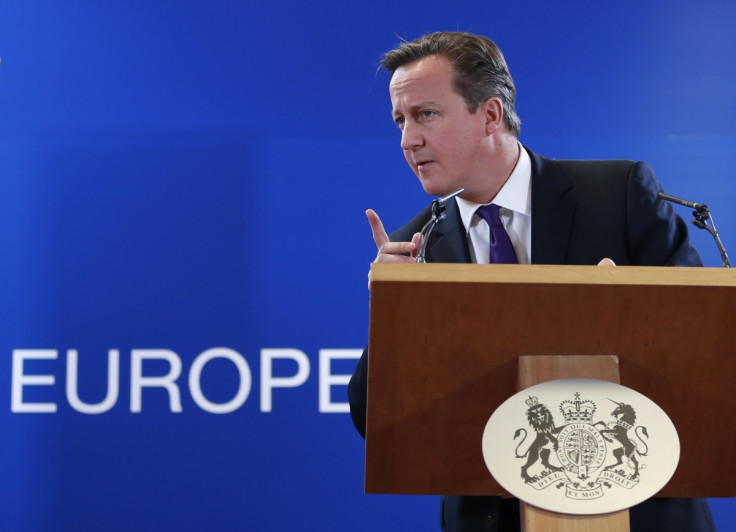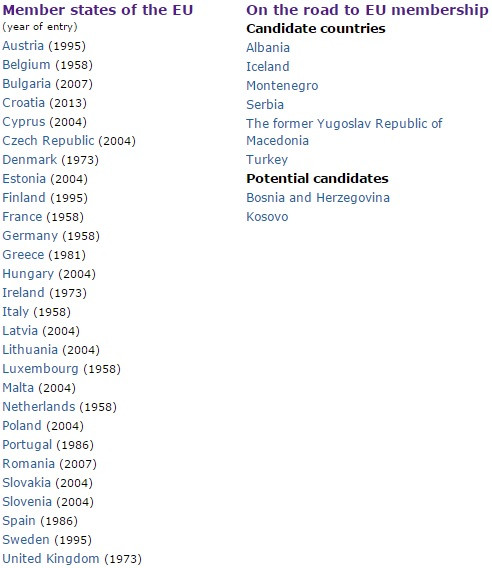What is the EU? Ten things you need to know before the Brexit referendum

Britain will vote in a referendum on its membership of the European Union (EU) after the Conservative Party, which promised one, won a majority at the 2015 general election.
The vote will take place by the end of 2017, by which time Prime Minister David Cameron hopes to have secured the agreement of other EU leaders on a number of reforms – strengthening the case for staying in, as he would like to do.
When the referendum takes place, the question on the ballot paper will be: "Should the United Kingdom remain a member of the European Union?"
Before you make your decision, Britain, here are ten things you need to know about what the EU is.
1) The EU is a marketplace that allows the citizens of member states to travel and trade (more or less) freely within its borders.
As it stands, there are 28 members of the EU, creating an internal market of 500 million citizens. EU citizens can travel freely within its borders, sometimes without passport checks at national borders if the country has signed up to the Schengen Agreement, and work without needing a permit or visa.
"The single or 'internal' market is the EU's main economic engine, enabling most goods, services, money and people to move freely," says the official EU website.
This is because there are few trade barriers between member states. Many have been removed and work is ongoing, albeit slowly, to dismantle those that remain, particularly in the service sector where reform has been much slower than for goods and commodities.
In practice, it means British manufacturers can export their products to elsewhere in the EU without having to pay trade tariffs and to quickly fill skills gaps by hiring foreign workers from within the EU with the appropriate knowledge and experience, if they cannot find someone suitable at home.
It gives them access to an enormous market and so greater potential revenue from selling their wares abroad, in turn supporting growth and job creation back in the UK while making the EU market more competitive and offering consumers a greater choice.
But in order to trade within the EU, British firms must stick to the EU rules and regulations, which many argue are unnecessarily burdensome, expensive and complicated.
2) It is a political union, as well as an economic one.
The original version of the EU was founded on the ashes of the Second World War. After centuries of violent destructive conflict, it was a means of preventing more slaughter. It united the economic and political interests of member states under a single umbrella. And it entrenched in law human rights to prevent anything like the Holocaust happening again in Europe.
At the signing of the Treaty of Rome in 1957, which created the original European Economic Community (EEC), the precursor to the EU, signatories including France, Germany and Italy resolved to create "an ever-closer union among the peoples of Europe" and "ensure the economic and social progress of their countries by common action".
But among eurosceptics, the political side of the EU is a burden, not a bonus. They see it as infringing on the sovereignty and supremacy of the British parliament over domestic affairs.
Some supporters of the EU argue that it further supports the fundamental rights of citizens, which should be upheld by every state anyway – and the EU is offering an extra layer of protection against national governments infringing on civil liberties.
3) There are four fundamental freedoms on which the EU is based.
These are the non-negotiable infrastructure of the entire European project. They are the free movement of people, goods, services and capital within the EU's borders.
4) Three central institutions make EU law.
They are the European Commission, the EU Council and the European Parliament.
The Commission is a group of 28 commissioners, each a technocrat selected by the government of a member state to represent it, which proposes and enforces EU laws, handles the budget and finances, and acts as the diplomatic arm of the EU in the international arena. The president of the Commission is elected by the commissioners.
The Council is made up of the elected ministers of the national governments of the member states. It meets to approve or reject laws proposed by the Commission. Its members also work together to discuss and co-ordinate matters, such as economic and foreign policy, and approve the EU budget. It also signs off on any deals made by the Commission between the EU and countries across the world.
The Parliament is made up of MEPs who are elected every five years in each member state. There are 751 in all. The work of the Parliament is to debate and approve laws proposed by the Commission, alongside the Council; scrutinise the EU's various bodies; and debate the budget.
5) There are other important institutions, such as the Court of Justice of the EU.
The EU has at least 65 institutions, bodies and agencies. The Court of Justice of the EU is one of the most important because it ensures EU law is applied fairly and equally across the whole of the internal market, so there is a level playing field for all in it.
Others include the European Investment Bank, which helps finance small businesses and funds EU investment projects, and the Committee of the Regions, which represents local authorities.
6) The powers, roles and responsibilities of the EU's institutions, as well as those of individual member states within the union, are governed by treaties agreed between members.
"A treaty is a binding agreement between EU member countries," says the official EU website.
"It sets out EU objectives, rules for EU institutions, how decisions are made and the relationship between the EU and its member countries."
Those member states then take the treaties back to their national parliaments to be voted on and ratified. Two of the most important treaties in recent years have been Maastricht in 1992 and Lisbon in 2007. Among other things, Maastricht set a public deficit and debt ceiling of 3% and 60% of GDP, respectively, for states who wanted to join the euro.
Lisbon was a replacement for the failed attempt to bring in a single written constitution for the EU to replace the founding treaties. Lisbon gave the EU more powers over areas of justice and home affairs, while also removing some of the vetos in policy areas previously held by member states.
And it clarified the role and powers of the EU, though critics said it was a power-grab that further eroded national sovereignty.
7) It is funded mostly by contributions from member states that are essentially membership fees.
The three central revenue-raisers for the EU are all from its member states. Every one contributes a standard annual fee calculated as a percentage of gross national income, which is around 0.7%.
"The underlying principles are solidarity and ability to pay – though the amount may be adjusted to avoid over-burdening particular countries," says the EU.
Then each state pays in around 0.3% of its annual VAT revenues. And a "large share of import duties on non-EU products (the country that collects the duty retains a small percentage)."
"The EU also receives income tax from EU staff, contributions by non-EU countries to certain EU programmes and fines on companies that breach EU rules and regulations," it adds.
8) The EU project is still a work in progress.
The single market is incomplete. There are, for example, still substantial barriers to trade between member states, particularly in the service sector, which the EU is slowly working to bring down.
"A competitive market in services is essential in order to promote economic growth and create jobs in the European Union," says the EU's 2006 Services Directive.
"At present numerous barriers within the internal market prevent providers, particularly small and medium-sized enterprises (SMEs), from extending their operations beyond their national borders and from taking full advantage of the internal market.
"This weakens the worldwide competitiveness of European Union providers. A free market which compels the member states to eliminate restrictions on cross-border provision of services while at the same time increasing transparency and information for consumers would give consumers wider choice and better services at lower prices."
The thinktank Open Europe reckons liberalising the EU's services market would boost European GDP by almost €300bn (£215bn, $329bn).
Part of the problem in completing the single market is the sluggishness with which some member states adopt EU-led reforms. For example, the EU dictates that member states must open up their national rail markets to competition from rail providers in other EU states.
This should help improve rail services and drive down ticket prices for consumers. While the UK has led the way in liberalising its rail market and opening up to EU providers, other states, such as France and Germany, have been stubborn to change.
9) It is ever-expanding.
The European project is inherently expansionist. It wants to suck in more states. The EEC started off in 1958 with six states. Then it enlarged in 1973, the year the UK joined. By 2015 it had 28 members with Croatia the last to join in 2013. Others, including Serbia, want to join and are working with the EU to bring their economics and politics in line with the rest of Europe.

10) No country has ever left the EU before.
The EU, and the Eurozone currency union within it, are supposed to be permanent projects. Once you're in, you're in. But for all the talk of a loss of national sovereignty by EU critics, the true power still lies with domestic parliaments – as the British are about to show. Because the referendum on staying in the EU will be binding and, should the UK vote to leave, it will pull out. The EU is powerless to stop it. But because no country has ever left before, there is no formal exit process. The mechanics of leaving are unknown and an orderly exit may be tricky. Or it could take a very long time to unpick the treaties and renegotiate trade deals with the EU.
Despite the existential threat to the UK's membership of the EU, it's not actually the favourite to leave first. That dubious honour is held by Greece, which is 2/5 on at William Hill to be the first out of the door as it teeters on the brink of bankruptcy and could crash out of the euro if it defaults on its debt.
William Hill has the UK at 3/1 to be first to leave the EU.
© Copyright IBTimes 2025. All rights reserved.





















